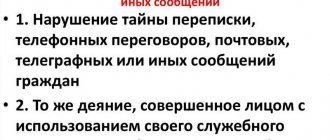Article 155. Disclosure of the secret of adoption
Disclosure of the secret of adoption against the will of the adoptive parent, committed by a person obliged to keep the fact of adoption as an official or professional secret, or by another person for selfish or other base motives -
shall be punishable by a fine in the amount of up to eighty thousand rubles, or in the amount of the wages or other income of the convicted person for a period of up to six months, or by compulsory labor for a term of up to three hundred sixty hours, or by corrective labor for a term of up to one year, or by arrest for a term of up to four months with deprivation of the right to hold certain positions or engage in certain activities for a period of up to three years or without it.
- Article 154. Illegal adoption
- Article 156. Failure to fulfill obligations to raise a minor
Commentary to Art. 155 of the Criminal Code of the Russian Federation
The object of disclosure of the secret of adoption is the family itself, and the conditions for the normal development and formation of the personality of a minor.
According to Art. 23 of the Constitution of the Russian Federation, everyone has the right to privacy, personal and family secrets, protection of their honor and good name. Adoption is one of the important institutions aimed at strengthening the family and protecting the interests of the child. In accordance with Art. 139 of the RF IC, the secret of adoption is protected by law, and persons who divulge the secret of a child’s adoption are held accountable in the manner prescribed by law. Judges who have made a decision on the adoption of a child, or officials carrying out state registration of adoption, as well as persons otherwise aware of the adoption, are obliged to maintain the secrecy of the adoption of a child.
According to paragraph 6 of the Resolution of the Plenum of the Supreme Court of the Russian Federation of April 20, 2006 No. 8 “On the application by courts of legislation when considering cases of adoption of children” in order to ensure the secrecy of adoption protected by law (Article 139 of the RF IC), the court in accordance with Art. 273 of the Code of Civil Procedure of the Russian Federation considers all cases of this category in a closed court hearing, including the announcement of the decision. For the same purposes, persons participating in the consideration of the case must be warned about the need to keep information about adoption that has become known to them secret, as well as about the possibility of bringing to criminal liability for disclosing the secret of adoption against the will of the adoptive parent in the cases provided for in Art. 155 of the Criminal Code of the Russian Federation, which is reflected in the minutes of the court hearing and is confirmed by the signatures of these persons.
———————————
Bulletin of the Supreme Court of the Russian Federation. 2006. N 6.
Violation of the secrecy of adoption can not only destroy a family, but also cause significant harm to the individual, since it usually entails serious moral experiences, the most dangerous for the child, capable of causing unhealed mental trauma and, thus, jeopardizing his health and normal development.
When qualifying the disclosure of the secret of adoption, this offense should be distinguished from such a crime as violation of privacy (Article 137 of the Criminal Code of the Russian Federation). Of course, divulging the secret of adoption is an interference in private life, but the first element of the crime is special, and therefore actions to divulge the secret of adoption should be qualified only under Art. 155 of the Criminal Code of the Russian Federation.
The objective side of the composition under consideration consists in the notification of the fact of adoption to any, at least one person, made without the consent of the adoptive parents orally or in writing (including the adopted person). Disclosure of information about an adoption that is not legally formalized in the proper manner (actual adoption) does not constitute a crime. The elements of the crime are formal - the crime is considered completed from the moment of commission of those specified in Art. 155 of the Criminal Code of the Russian Federation of actions. It should be borne in mind that doctrinal interpretations of this norm differ. Thus, some researchers claim that if at least one of the adoptive parents (meaning cases where adoption is carried out by spouses) agreed to divulge the secret of adoption, there is no corpus delicti, others indicate that there will be corpus delicti in this case. From our point of view, based on the literal interpretation of the disposition of Art. 155 of the Criminal Code of the Russian Federation, according to which the unlawful act consists of “disclosing the secret of adoption against the will of the adoptive parent,” the objective side of the crime is fulfilled when one of the adoptive parents, contrary to the will of the other adoptive parent, divulges the secret of adoption, since the law specifies the adoptive parent in the singular.
The subjective side of the crime is characterized by direct intent: the person is aware that he is violating the secrecy of adoption against the will of the adoptive parent, and wants to commit these actions. If a crime is committed by a person whose duties do not include maintaining the secrecy of adoption, selfish or other base motives are necessary for the existence of corpus delicti.
The subject of the crime can be both special and general. A special subject of a crime is a sane person who has reached the age of sixteen and is obliged to keep the fact of adoption as an official or professional secret. General subject - any other person who meets the requirements of the general subject, acting from selfish or other base motives.
The threat of divulging the secret of adoption, associated with a demand addressed to adoptive parents to transfer their property or the right to their property or to perform other actions, is qualified as extortion under Art. 163 of the Criminal Code of the Russian Federation.
Article 155. Payment for residential premises and utilities
Article 155. Payment for residential premises and utilities
[Housing Code] [Title VII]
. Payment for residential premises and utilities is paid monthly before the tenth day of the month following the expiration of the month, unless a different period is established by the management agreement of the apartment building or by decision of the general meeting of members of the homeowners association, housing cooperative or other specialized consumer cooperative created to meet the needs citizens in housing in accordance with the federal law on such a cooperative (hereinafter referred to as another specialized consumer cooperative).
. Payment for residential premises and utilities is paid based on:
- 1) payment documents (including payment documents in electronic form posted in the system) submitted no later than the first day of the month following the previous month, unless a different period is established by the management agreement of an apartment building or by a decision of the general meeting of members of the homeowners association, housing cooperative or other specialized consumer cooperative;
- 2) information on the amount of payment for residential premises and utilities, arrears for payment of residential premises and utilities, posted in the system or in other information systems that allow payment for residential premises and utilities. Information on the amount of payment for residential premises and utilities and debts for payment of residential premises and utilities is information about charges in the system, information contained in the payment document submitted to the e-mail address of the service consumer or in the payment document received through information terminals.
2.1. Payment documents, information on the amount of payment for residential premises and utilities and debts for payment of residential premises and utilities are subject to placement in the system within the period provided for in Part 2 of this article.
2.2. Lost force from January 1, 2021 - Federal Law of December 31, 2021 N 485-FZ
2.3. Lost force from January 1, 2021 - Federal Law of December 31, 2021 N 485-FZ
. Tenants of residential premises under a social tenancy agreement and a rental agreement for residential premises of the state or municipal housing stock pay a fee for the use of residential premises (rental fee) to the landlord of this residential premises.
. Tenants of residential premises under a social tenancy agreement and a rental agreement for residential premises of a state or municipal housing stock in an apartment building, which is managed by a management organization, pay a fee for the maintenance of the residential premises, as well as a fee for utilities to this management organization. If the amount of the fee paid by the tenant of the residential premises is less than the amount of the fee established by the management agreement, the remaining part of the fee is paid by the landlord of this residential premises in the manner agreed with the management organization.
4.1. The tenant of residential premises under a rental agreement for residential premises of a social housing stock pays payment for residential premises and utilities to the landlord of such residential premises, unless this agreement provides for the payment by the tenant of payments for all or some utilities to resource-supplying organizations.
. Members of a homeowners' association or a housing cooperative or other specialized consumer cooperative make mandatory payments and (or) contributions related to the payment of expenses for the maintenance and current repairs of common property in an apartment building, as well as payment for utilities, in the manner established by the governing bodies of the partnership homeowners or the management bodies of a housing cooperative or the management bodies of another specialized consumer cooperative, including paying contributions for major repairs in accordance with Article 171 of this Code.
. Owners of premises in an apartment building in which a homeowners' association or housing cooperative or other specialized consumer cooperative is not a member of a homeowners' association or a housing cooperative or other specialized consumer cooperative pay fees for the maintenance of residential premises and fees for utilities in accordance with the agreements , concluded with a homeowners’ association or a housing cooperative or other specialized consumer cooperative, including paying contributions for major repairs in accordance with Article 171 of this Code.
6.1. If a homeowners' association or a housing cooperative or other specialized consumer cooperative concludes a management agreement for an apartment building, fees for utilities are paid by the persons specified in paragraphs 1-5 of part 2 of Article 153 of this Code to the management organization.
6.2. A management organization, homeowners' association or housing cooperative or other specialized consumer cooperative that receives payment for utility services makes payments for the resources necessary to provide utility services with persons with whom such management organization, homeowners' association or housing cooperative or other a specialized consumer cooperative has concluded contracts for cold and hot water supply, sewerage, electricity supply, gas supply (including the supply of domestic gas in cylinders), heating (heat supply, including the supply of solid fuel in the presence of stove heating), in accordance with the requirements established by the Government of the Russian Federation Federation. A management organization, a homeowners' association or a housing cooperative or other specialized consumer cooperative that receives payment for a utility service for the management of municipal solid waste, makes payments for the service provided with the regional operator for the management of municipal solid waste, with which such management organization, partnership homeowners or a housing cooperative or other specialized consumer cooperative has entered into an agreement for the provision of services for the management of municipal solid waste in accordance with the requirements established by the Government of the Russian Federation.
6.3. Lost force from April 3, 2021 - Federal Law of April 3, 2021 N 59-FZ
. Owners of premises in an apartment building in which a homeowners' association or a housing cooperative or other specialized consumer cooperative has not been created and which is managed by a management organization, pay for residential premises and utilities to this management organization, except for the cases provided for in Article 171 of this Code.
7.1. Lost force from April 3, 2021 - Federal Law of April 3, 2021 N 59-FZ
7.2. If the person specified in clause 6 of part 2 of Article 153 of this Code concludes a management agreement for an apartment building with a management organization selected based on the results of an open competition provided for in part 13 of Article 161 of this Code, and also if the management agreement for an apartment building is concluded with by the specified person in accordance with Part 8 of Article 161 of this Code, payment for residential premises and utilities is paid to such a management organization.
7.3. When a developer manages an apartment building without concluding a management agreement for such a building with the management organization, payment for residential premises and utilities is paid by the person specified in paragraph 6 of part 2 of Article 153 of this Code to the developer.
7.4. When the developer, in the case provided for in Part 14 of Article 161 of this Code, enters into a management agreement for an apartment building with a management organization, payment for residential premises and utilities is paid by the person specified in paragraph 6 of Part 2 of Article 153 of this Code to such management organization.
7.5. In the cases provided for in Article 157.2 of this Code, payments for utility services are paid by the owners of premises in an apartment building and tenants of residential premises under social tenancy agreements or rental agreements for residential premises of the state or municipal housing stock in a given building to the relevant resource supply organization and the regional operator for the handling of solids. municipal waste.
. Owners of premises in an apartment building who directly manage such a building pay fees for residential premises and utilities in accordance with agreements concluded with persons engaged in the relevant types of activities.
. Owners of residential buildings pay for services and work on their maintenance and repair, and also pay for utilities in accordance with agreements concluded with persons engaged in the relevant types of activities.
. Owners of premises in an apartment building pay for services and work on the maintenance and repair of these premises in accordance with agreements concluded with persons carrying out the relevant types of activities.
. Failure to use the premises by owners, tenants and other persons is not grounds for failure to pay for residential premises and utilities. In the temporary absence of citizens, payment for certain types of utility services, calculated on the basis of consumption standards, is carried out taking into account the recalculation of payments for the period of temporary absence of citizens in the manner and in cases approved by the Government of the Russian Federation.
. Payment for utilities provided to temporary residents is paid by the tenant of the residential premises in accordance with an additional agreement with the landlord concluded for the period of residence of temporary residents.
. The landlord and management organization are obliged to inform in writing, respectively, tenants of residential premises of state and municipal housing funds and owners of residential premises in an apartment building about changes in the amount of payment for residential premises and utilities no later than thirty days before the date of submission of payment documents, on the basis of which Payment for residential premises and utilities will be paid in a different amount, unless a different period is established by the management agreement.
. Persons who have lately and (or) not fully paid for housing and utilities are required to pay the lender a penalty in the amount of one three hundredth of the refinancing rate of the Central Bank of the Russian Federation, effective on the day of actual payment, of the amount not paid on time for each day of delay starting from the thirty-first day following the day of the established payment due date until the day of actual payment made within ninety calendar days from the date of the established payment due date, or until the expiration of ninety calendar days after the date of the established payment due date, if payment is not made within the ninety-day period produced. Starting from the ninety-first day following the day of the established payment deadline until the day of actual payment, penalties are paid in the amount of one hundred and thirtieth of the refinancing rate of the Central Bank of the Russian Federation, effective on the day of actual payment, of the amount not paid on time for each day of delay. An increase in the amounts of penalties established by this part is not allowed.
14.1. Owners of premises in an apartment building who have lately and (or) not fully paid contributions for capital repairs are required to pay a penalty to the capital repair fund in the amount of one three hundredth of the refinancing rate of the Central Bank of the Russian Federation, effective on the day of actual payment, of the amount not paid on time for each day of delay starting from the thirty-first day following the day of the established payment deadline until the day of actual payment. Payment of the specified penalties is carried out in the manner established for the payment of contributions for major repairs.
. The landlord of a residential premises, management organization, other legal entity or individual entrepreneur who, in accordance with this Code, pays for residential premises and utilities, as well as their representative, has the right to make settlements with tenants of residential premises of state and municipal housing funds and owners of residential premises and collect fees for residential premises and utilities with the participation of payment agents engaged in accepting payments from individuals, as well as bank payment agents operating in accordance with the legislation on banks and banking activities. In this case, the landlord of a residential premises, management organization, other legal entity or individual entrepreneur who, in accordance with this Code, pays for residential premises and utilities, as well as their representative, has the right to collect in court the overdue debt for payment for residential premises and utilities services.
. When persons specified in part 15 of this article engage representatives to make settlements with tenants of residential premises of state and municipal housing funds, owners of residential premises and to collect payments for residential premises and utilities, the consent of the subjects of personal data to transfer personal data to such representatives is not required.
. Payment for residential premises and utilities can be made using the system, including on the basis of contracts for the supply of resources necessary for the provision of utilities, contracts for the provision of services and (or) performance of work on the maintenance and repair of common property in apartment buildings, for the provision utilities concluded electronically using the system.
. A management organization, a homeowners' association or a housing cooperative or other specialized consumer cooperative, a resource supplying organization, a regional operator for the management of municipal solid waste, which, in accordance with this Code, pays for residential premises and utilities, does not have the right to assign the right (claim) under return of overdue debts for payment of payments for residential premises and utilities to third parties, including credit institutions or persons engaged in the return of overdue debts of individuals. The agreement concluded in this case on the assignment of the right (claim) to return the overdue debt for payment for residential premises and utilities is considered void. The provisions of this part do not apply to the case of assignment of the right (claim) to return overdue debt for payment for residential premises and utilities to a newly selected, selected or determined management organization created by a homeowners association or a housing cooperative or other specialized consumer cooperative, other resource supply organization , a selected regional municipal solid waste management operator.
. A management organization, a homeowners' association or a housing cooperative or other specialized consumer cooperative, a resource supply organization, a regional municipal solid waste management operator or a newly selected, selected or determined management organization created by a homeowners' association or a housing cooperative or other specialized consumer cooperative, other the resource supplying organization, the selected regional operator for the management of municipal solid waste are obliged to notify in writing the owner of the premises in an apartment building and the tenant of the residential premises under a social tenancy agreement or a rental agreement for residential premises of the state or municipal housing stock, who have an overdue debt to pay for residential premises and utilities, on the assignment of the right (claim) to return such debt to a newly selected, selected or determined management organization created by a homeowners' association or housing cooperative or other specialized consumer cooperative, other resource supply organization, selected regional operator for the treatment of solid utilities waste within ten working days from the date of conclusion of the agreement on the assignment of the right (claim) to return the overdue debt for payment for residential premises and utilities. The specified owner and tenant have the right not to fulfill the obligation to repay the overdue debt for payment for residential premises and utilities to a newly selected, selected or determined management organization, created by a homeowners' association or housing cooperative or other specialized consumer cooperative, other resource supply organization, selected regional operator for the management of municipal solid waste before providing them with notification of the assignment of the right (claim) to return such debt.
Judicial practice under Article 155 of the Criminal Code of the Russian Federation
Determination of the Constitutional Court of the Russian Federation dated May 29, 2019 N 1239-O
The legislator defined extortion as a crime against property and established that the methods of its commission can be either the threat of violence or the destruction or damage of someone else’s property, or the threat of disseminating information disgracing the victim or his relatives , or other information that may cause significant harm to the rights or legitimate interests of the victim or his relatives. At the same time, contrary to the applicant’s arguments, Article 163 of the Criminal Code of the Russian Federation in itself is not aimed at criminal law protection of certain types of secrets, the protection of which from criminal attacks is carried out by independent norms of criminal law (including Articles 137, 155 and 183 of the Criminal Code of the Russian Federation) .
Determination of the Constitutional Court of the Russian Federation dated May 25, 2017 N 1013-O
According to the article of the Criminal Code of the Russian Federation, the basis of criminal liability is the commission of an act containing all the elements of a crime provided for by this Code. Consequently, when qualifying an act, including under Article 163 of the Criminal Code of the Russian Federation, it is necessary to establish both objective and subjective elements of the crime. In this case, the explanations given by the Plenum of the Supreme Court of the Russian Federation in the Resolution of December 17, 2015 N “On judicial practice in cases of extortion (Article 163 of the Criminal Code of the Russian Federation)”, which draws the attention of the courts to the fact that under the information, disgracing the victim or his relatives, one should understand information that discredits their honor, dignity or undermines their reputation (for example, information about the commission of an offense, an immoral act); in this case, it does not matter whether the information under the threat of dissemination of which extortion is committed is true; other information, the dissemination of which may cause significant harm to the rights or legitimate interests of the victim or his relatives, includes, in particular, any information constituting a secret protected by law; dissemination during extortion of knowingly false information discrediting the honor and dignity of the victim and (or) his relatives or undermining his (their) reputation, illegal dissemination of information about the private life of a person that constitutes his personal or family secret, disclosure of the secret of adoption against his will adoptive parent, illegal disclosure of information constituting commercial, tax or banking secrets, form a set of crimes provided for in the relevant parts of Articles 128.1, 137, 155 or 183 and Article 163 of the Criminal Code of the Russian Federation (clause 12); if the demand for the transfer of property or the right to property or the commission of other actions of a property nature is lawful, but is accompanied by the threat specified in part one of Article 163 of the Criminal Code of the Russian Federation, then such actions do not entail criminal liability for extortion (clause 13).








